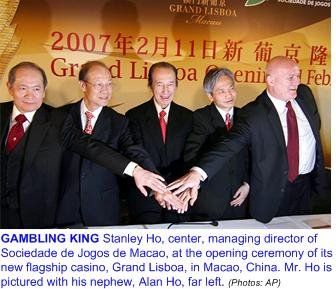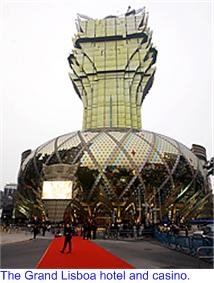 Today, five years after Stanley Ho’s gambling monopoly expired, the Americans plan to bury Ho’s old collection of smoky ballrooms empire. The Wynn Macao hotel and casino, from the Vegas heavyweight Steve Wynn’s Wynn Resorts (Nasdaq: WYNN, stock), opened last September. The MGM Mirage (NYSE: MGM, stock) has a huge project going up next door. And Las Vegas Sands (NYSE: LVS, stock) is building the world’s biggest casino and convention center worth $12 billion.
Today, five years after Stanley Ho’s gambling monopoly expired, the Americans plan to bury Ho’s old collection of smoky ballrooms empire. The Wynn Macao hotel and casino, from the Vegas heavyweight Steve Wynn’s Wynn Resorts (Nasdaq: WYNN, stock), opened last September. The MGM Mirage (NYSE: MGM, stock) has a huge project going up next door. And Las Vegas Sands (NYSE: LVS, stock) is building the world’s biggest casino and convention center worth $12 billion. Stanley Ho was born in 1921, into one of Hong Kong’s wealthiest and most prominent families. His grandfather, who was of Chinese and European descent, was a comprador, or go-between, for Jardine Matheson, the legendary British trading house and power broker that once dominated the colony’s maritime trade as well as its opium trade. Mr. Ho’s uncle helped finance Sun Yat-sen, who led the overthrow of the Qing Dynasty in 1911 and founded the Chinese Republic. And his father was a comprador for the powerful Sassoon trading house.
Stanley Ho was born in 1921, into one of Hong Kong’s wealthiest and most prominent families. His grandfather, who was of Chinese and European descent, was a comprador, or go-between, for Jardine Matheson, the legendary British trading house and power broker that once dominated the colony’s maritime trade as well as its opium trade. Mr. Ho’s uncle helped finance Sun Yat-sen, who led the overthrow of the Qing Dynasty in 1911 and founded the Chinese Republic. And his father was a comprador for the powerful Sassoon trading house.
In the 1930s, amid a global depression, Stanley Ho’s father went broke and fled to Vietnam, leaving the family penniless. In 1941, after the Japanese occupied Hong Kong, Stanley dropped out of college and fled with other refugees to Macao. There, he made his first fortune by helping to run a trading company that swapped goods with the Japanese in exchange for food to feed Macao’s starving population.
After the war, Stanley returned to Hong Kong a wealthy man. He built upon that success in 1962, when he helped form an investor group that won the exclusive right to run all of Macao’s gambling operations. Mr. Ho had promised to bolster tourism by modernizing Macao and upgrading its infrastructure. But the main business of the original company – Sociedade de Turismo e Diversões de Macao, or STDM – was gambling, which was legalized in Macao in 1847 after Hong Kong unseated the Portuguese colony as the region’s major trading port.
Stanley’s casinos only see the real money flowing in at the late 1980s, after China’s economic reforms which created a class of wealthy entrepreneurs and gamblers. According to some historians, the bulk of Stanley Ho’s gambling revenue came from V.I.P. rooms he subcontracted out to groups that lured Asia’s high rollers to Macao. The subcontractors shared the gambling profits with Stanley Ho’s casinos.
Though the Law enforcement officials and gambling analysts say that many of the V.I.P. room operators had links to Chinese organized crime groups known as triads, they admitted the business model was a smart and brilliant way to maximize profit because it required very little investment on Stanley’s part. Stanley Ho’s casinos only had to provide the rooms, chips and dealers – the casino did not have to search for big customers, do background checks or ensure that the high rollers paid their debts. Stanley never denied that organized-crime figures operated in his casinos either.

|
|
March 25th, 2007 by financetwitter
|


|

|

|

|

|

|




























Comments
Add your comment now.
Leave a Reply